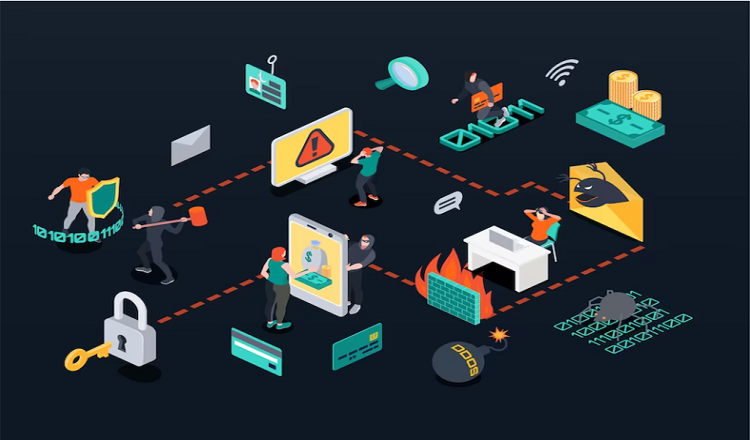The role of government policies and regulations in shaping cybersecurity and data privacy
Data privacy and cybersecurity are major concerns in a world where we depend more on technology than ever. Governments all over the world have adopted policies and regulations to safeguard people and organizations from cyber attacks and data breaches as personal information is being kept online in ever-increasing quantities.
It is impossible to exaggerate the impact of government laws and regulations on data privacy and cybersecurity. Governments are now in charge of protecting individuals’ personal information and ensuring that companies are taking the necessary precautions to protect the data of their clients. The risks and threats posed by cyber assaults and data breaches would be substantially larger in the absence of these norms and legislation.
Although implementing data privacy and cybersecurity policies might be difficult, their significance cannot be understated. This blog will examine the many laws and rules that have been put in place by countries to address cybersecurity and data privacy issues. We will also talk about the difficulties in adopting and enforcing these laws and rules, as well as the consequences of non-compliance. So take a coffee, settle down, and let’s explore the intriguing world of data privacy and cybersecurity!
Government needed for data privacy
Because of the hazards and threats posed by cyber attacks and data breaches, which are becoming more sophisticated and widespread, government engagement is crucial in the fields of cybersecurity and data privacy. Data breaches and cyberattacks have the potential to cause enormous financial losses, identity theft, and reputational harm. These assaults and breaches have wide-ranging potential effects that might affect entire businesses, sectors of the economy, and even entire countries.
Given the magnitude of these hazards, governments have a duty to safeguard their people and businesses by putting in place laws and rules that oblige enterprises to take the necessary precautions to protect their data. Organizations may lack the essential incentives to invest in cybersecurity and data privacy protections without government action, making them exposed to cyberattacks and data breaches. Therefore, government action is required to guarantee that sufficient safeguards for personal and sensitive data are in place.
Government regulates data privacy, cybersecurity
Different laws and policies have been put into place by governments all over the world to address concerns about data privacy and cybersecurity. These laws and guidelines are intended to safeguard confidential and private data against online threats and data breaches. The General Data Protection Regulation (GDPR) in the European Union, the Cybersecurity Information Sharing Act (CISA) in the United States, and the Personal Information Protection and Electronic Documents Act (PIPEDA) in Canada are some examples of successful laws and their effects on cybersecurity and data privacy.
By forcing enterprises to seek individuals’ explicit consent before collecting and using their personal data, the GDPR has significantly impacted data privacy. Similar to this, CISA has aided in enhancing cybersecurity by encouraging enterprises and the government to share threat intelligence. By requiring organizations to acquire consent before collecting, using, or disclosing personal information, PIPEDA has helped to secure personal information. These laws and rules show how crucial it is for the government to become involved with data privacy and cybersecurity, as well as how effective well-crafted policies can be at protecting sensitive and private data.
Regulations ensure privacy and cybersecurity
In order to maintain compliance with cybersecurity and data privacy laws, regulations are essential. They offer a framework that businesses may use to safeguard sensitive and private data from cyberattacks and data breaches. Regulations frequently specify requirements and benchmarks that businesses must achieve, including installing encryption or two-factor authentication.
Organizations that violate regulations may suffer serious repercussions, such as fines, legal repercussions, and reputational harm. In addition, non-compliance can lead to cyberattacks and data breaches, which can hurt people and companies permanently. In order to preserve the integrity of data privacy and cybersecurity rules, regulatory compliance is crucial. Organizations may demonstrate their dedication to safeguarding sensitive information, earn customers’ trust, and avert potential repercussions by adhering to legislation.
Global Data Privacy and Cybersecurity Rules
Regulations governing cybersecurity and data privacy vary between nations due to disparate cultural and legal systems. For instance, the General Data Protection Regulation (GDPR), which is regarded as one of the world’s strictest data privacy policies, was put into effect by the European Union. China and Russia, in contrast, have put stronger state-centric cybersecurity policies into place. Multinational firms that must negotiate various regulatory requirements and cultural standards may find these variations to be challenging.
Global resource, political, and technological disparities might make it difficult to implement and enforce cybersecurity and data privacy rules. The absence of a universal legal framework and differences in national sovereignty can also make it challenging to enforce laws across international boundaries. In order to handle the intricate and dynamic landscape of global cybersecurity and data privacy, governments, companies, and individuals must continue to collaborate and coordinate.
Issues with gov cybersecurity policies
In order to adopt cybersecurity and data privacy policies, governments must overcome a number of obstacles, including a lack of resources and experience, a lack of public awareness and education, and difficulty enforcing regulations across international borders. Furthermore, it may be challenging for regulations to keep up with the altering state of data privacy and cybersecurity due to the rapid growth of technology and the dynamic nature of cyber threats.
The potential consequences of inefficient policy implementation might be severe, increasing vulnerabilities and the dangers of cyberattacks and data breaches. Personal and confidential data may be compromised as a result, and businesses and governments may suffer reputational harm. Ineffective rules can also contribute to a lack of confidence among people and groups, which will decrease engagement in digital activities and impede the expansion of the digital economy. Governments must therefore confront the difficulties of enacting effective legislation and assure the security of private information in the digital era.
Conclusion
To summarize, it is critical for governments to play a role in shaping cybersecurity and data privacy in order to shield people and businesses from the dangers and threats posed by cyberattacks and data breaches. Globally, a number of laws and regulations have been put into place, proving how crucial it is for the government to get involved in protecting sensitive data. By outlining clear guidelines and expectations for enterprises to adhere to, these rules and regulations encourage adherence to cybersecurity and data privacy practices. However, due to disparities in statutory requirements, cultural values, and technological infrastructure, adopting and enforcing international standards can be difficult. Therefore, it is essential for governments, companies, and individuals to continuously collaborate and coordinate in order to address the complex and dynamic landscape of global cybersecurity and data privacy.
The significance of continuous government involvement in data privacy and cybersecurity cannot be emphasized, in our opinion. Governments must be cautious in their attempts to safeguard sensitive data as cyber threats continue to change and become more sophisticated. Governments may contribute to ensuring a safe and secure digital environment for persons and enterprises by putting in place efficient policies and regulations, supporting compliance with cybersecurity requirements, and encouraging data privacy.
Read More You May Like:














Post Comment